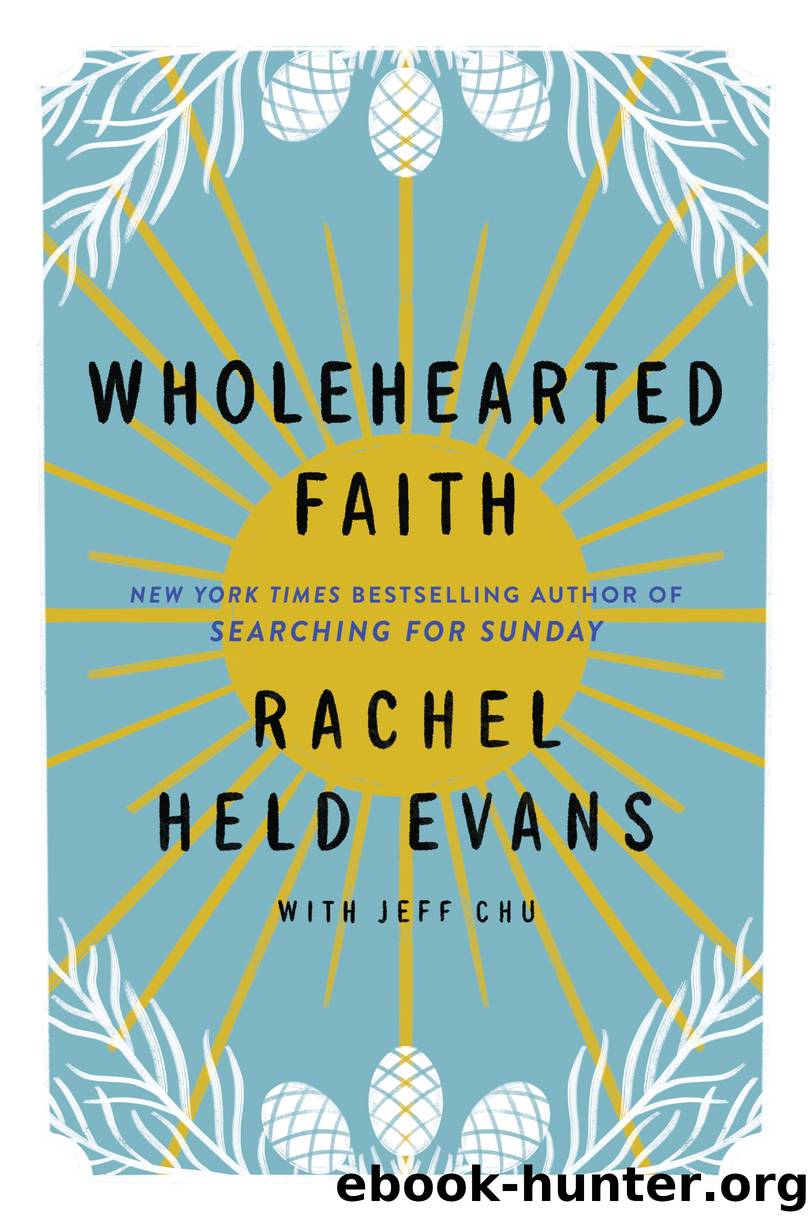Wholehearted Faith by Rachel Held Evans

Author:Rachel Held Evans
Language: eng
Format: epub
Publisher: HarperOne
Published: 2021-09-13T00:00:00+00:00
* * *
Itâs one thing to say that Jesus was willing to die. The question many of us have wrestled with is slightly different: Why did Jesus have to die?
In my childhood understanding of sin and Jesusâs intervention, Christ substituted his beauty for my ugliness, his perfection for my flaws. It was as if the mere thought of me would be so unbearable and enraging to a holy God that my only salvation would be if someone held up a photo of me and God somehow saw a picture of Jesus instead. Despite Godâs omnipotence, omniscience, and omniâeverything else, was the very sight of me so bad?
So many hymns and songs concretize this understanding of Godâs anger, wrath, and utter disappointmentâuntil Jesus. Thereâs âNothing but the Blood of Jesusâ: âNaught of good that I have done / Nothing but the blood of Jesus.â Or âIn Christ Aloneâ: âTill on that cross as Jesus died / The wrath of God was satisfied.â
I am sure that some critic out there will read this and think, Oh, there she goes againâRachel Held Evans with her heretical ways, Rachel Held Evans elevating humanity and diminishing the divine, Rachel Held Evans tempting the vulnerable with her confusions. If itâs heretical to ask questions about the nature of Godâs love or the love of Godâs nature, then let me be a heretic. If itâs heretical to muse about the incongruence of a patient God who exists beyond time being infuriated by my little errors, then let me be a heretic. If itâs heretical to wonder what the proper pronouns might be for God, then let me be a heretic (once, I used a feminine pronoun for God, and people still point to that as a reason to wish me a hasty death, which makes me wonder how theyâll feel when they enter Godâs full presence someday and learn that God isnât a dude).
Iâm just trying to see humanity for what it isâand God for who God is. And better the confusion that vulnerability might engender and the lack of clarityâone might more charitably call it humilityâabout atonement theories than the false certainty that has kept so many bound to their self-loathing and their sense of being unlovable to God.
To be clear, Iâm not trying to construct a new certainty, a more enlightened fundamentalism, to replace the old versions. That would just be a slightly prettier idol than the one we had before. My hope instead is to urge us toward faithful wondering: What if some of the stories weâve been telling ourselves, well intentioned as they might be, should be shelved as fiction? What if those narratives need to be put to death so that something more nourishing, something centered on holy flourishing, something truer, might live?
We are not the first to go this way. In the Jewish tradition, thereâs a long history of faithful wondering. Itâs summarized in the midrash, ancient commentaries by the rabbis that contain their speculations about what lies off the page of Scripture, about all the details that didnât make the main scroll.
Download
This site does not store any files on its server. We only index and link to content provided by other sites. Please contact the content providers to delete copyright contents if any and email us, we'll remove relevant links or contents immediately.
Harry Potter and the Goblet Of Fire by J.K. Rowling(3046)
Unfinished: A Memoir by Priyanka Chopra Jonas(2918)
Never by Ken Follett(2882)
The Man Who Died Twice by Richard Osman(2300)
Machine Learning at Scale with H2O by Gregory Keys | David Whiting(2292)
Fairy Tale by Stephen King(2071)
Will by Will Smith(2043)
Rationality by Steven Pinker(1765)
The Storyteller by Dave Grohl(1661)
The Dawn of Everything: A New History of Humanity by David Graeber & David Wengrow(1571)
The Dark Hours by Michael Connelly(1571)
The Stranger in the Lifeboat by Mitch Albom(1532)
Cloud Cuckoo Land by Anthony Doerr(1435)
The Becoming by Nora Roberts(1331)
Friends, Lovers, and the Big Terrible Thing by Matthew Perry(1330)
New Morning Mercies: A Daily Gospel Devotional by Paul David Tripp(1325)
Crying in H Mart by Michelle Zauner(1316)
Einstein: His Life and Universe by Walter Isaacson(1315)
A Short History of War by Jeremy Black(1300)
